The day Daniel Moi dropped William Omamo from Cabinet for praising Jaramogi
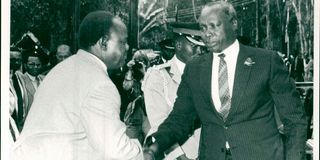
President Moi (right) and Minister for Agriculture and Livestock Development Dr William Odongo Omamo.
One regular occasion that would vividly remind us that we were both students of Maseno and citizens of the world, was the annual meeting of the Maseno Old Boys Association.
During such gatherings, Maseno alumni would be invited to the school to discuss the welfare of the school. It was an important day on the calendar, and many old boys travelled from all corners of the country to attend. The day would start mid-morning when the old boys would be taken around the school to tour new developments. Lunch would then be served, after which the old boys would meet in a lengthy plenary session.
In the evening, a special dinner would be served, during which there would be performances from different classes and dormitories in the form of dances, theatrical performances and songs. The event was known as “The School Concert”.
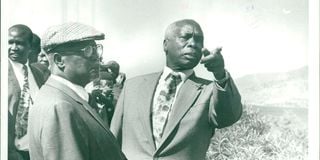
President Daniel Moi (right) and Jaramogi Oginga Odinga during the commissioning of the Turkwel Power Project in 1987.
It was during such a concert in 1945 (when he was still in the primary section of Maseno School) that one of the old boys, Jaramogi Oginga Odinga, stood up to applaud me for my performance. Speaking in Dholuo at the top of his voice, he called the audience to attention, saying:
“Winjauru, tuke mag nyathi miluongo ni Odongo ema otoyowa, riteuru maber,” he said.
Which means: “Listen to me, the performance of the young boy called Odongo has greatly impressed us, his appearances in the different events were most entertaining. Look after him well.”
This was the first but not the last time that Jaramogi took note of Omamo in School.
Fast forward to 1949 when the writer had just completed his O-levels at Maseno School as the pioneer O-level class. Towards the close of the third term in 1949, my class attempted the Cambridge School Certificate Examination. We created a record when all of us passed: One scored a Division I, Twelve scored a Division II, and Three scored a Division III. In addition to the Cambridge School Certificate Examination, we also attempted the Makerere College Entrance Examination, and 50% of our class passed.
Makerere College
The principal called me and expressed his shock and disappointment that I did not pass the examination ... But as history was to show later, it was just as well that I did not go to Makerere College in 1950. The Principal, Arthur William Mayor was so fond of me that he invited me to return to the school for the final term of 1950, to repeat both the Makerere College Entrance Examination and the Cambridge School Certificate Examination. I accepted his offer on the spot.
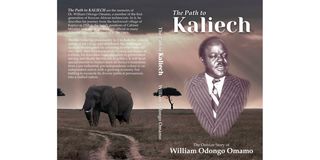
The cover of 'The Path to Kaliech' the memoirs of Dr William Odongo Omamo.
When the time came for me to return to Maseno School, a totally new chapter was opened for me. My friend, Benjamin Monye Ogol, had graciously accepted to put me up during the term, and it was while in his house that I learnt about an impending visit to Maseno by the then India High Commissioner to Kenya, Shree Apa Sahib Pant. The purpose of the visit was to open the Maseno store, which had been built by Luo Thrift and Trading Corporation.
While arrangements for the visit were being made, I contacted Jaramogi Oginga Odinga and told him of my desire to pursue studies overseas. The idea had been planted in my mind when four of my former teachers – Meshack Ojal, Akatsa Webungo, Obath Ishmael and Simeon Ominde – left us at Maseno School to take up scholarships to study in the United Kingdom.
My dreams about going overseas for further studies were therefore not far-fetched, and when in October 1950 I discussed the possibilities with Jaramogi, it was not idle daydreaming. Strengthening my case further, my 1949 Cambridge School Certificate Examination results had sufficiently impressed him for him to take the initiative to introduce me to the India High Commissioner when the latter came to officially open the store and discreetly requested him to help me pursue further studies in India.
When we met, the wife of the High Commissioner took my certificate and scanned through it. I had obtained a second division certificate with distinction in general science and credits in mathematics, English language, English literature, geography, history and Christian religious education. She then whispered to the High Commissioner: “Here is a bright boy.” The High Commissioner turned around, surveyed me from my foot up and assured me on the spot that he would do his best to get me to India. My young active mind started building educational castles in the air right away.
Repeating the third term at Maseno School had turned out to be a convenient stepping stone to India. Once the High Commissioner had assured me that my 1949 Cambridge results were all that was required to get admission to a good Indian university, I lifted my foot off the gas pedal. I therefore did not take either the Makerere Entrance or the Cambridge School Certificate examinations seriously.
Indian High Commissioner
By and by, Jaramogi was invited to Nairobi to join a selection panel formed by the Indian High Commissioner. They were to select four Kenyan students to benefit from the government of India's cultural scholarships. Members of the panel included Hon. Eluid Mathu and Hon. Jaramogi Oginga Odinga of the Kenyan Legislative Council and the High Commissioner himself. While Eliud Mathu was quick to take three scholarships for the Central Province candidates, Jaramogi pleaded with the panel not to send him back to Nyanza empty handed. Therefore, the fourth scholarship, which was for the study of agriculture, was offered to him. He took it and attached my application to it. I had on my part applied to study either economics or veterinary science. When Jaramogi came back from Nairobi, he sent for me and broke the news that there was only one scholarship available, and it was for agriculture. He asked me whether I would take it.
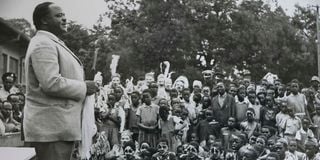
Dr William Odongo Omamo addressing a gathering.
I said: “Even if what was offered to me was a scholarship to study the claws of dogs, I would take it gladly.” We shook hands heartily and I thanked Jaramogi from the bottom of my heart for his generosity. He handed me the detailed application forms and I went back home beaming with joy.
It took me two months to fill the application forms in detail. I had to get academic records from my days at Maranda Sector School, all the way to Maseno Secondary School, obtaining records of all the examinations I had passed and collecting all certificates to confirm my full membership to the Anglican Church. I also had to get testimonials from the Principal at Maseno.
It was tiresome but necessary. I worked late in the night with Okuto Bala, the manager of Maseno Store, to get all the materials typed. On one such occasion, we worked past midnight into the wee hours of the morning. At 2am, there was a loud bang on the door. When Okuto opened the door, it was Jaramogi himself. He was driving along the Maseno/Kisumu road, saw a light still beaming in the store, and so decided to check what was happening. When Okuto explained to him what the two of us were doing, he encouraged us to keep going and ensure we would be ready to submit the application the following day.
I went on to study agriculture in India from 1951, courtesy of the largesse of Jaramogi. This fact was later to haunt him when he was a minister in President Moi’s government in 1987. He went on to record as follows:
My lengthening shadow in public life did not please all my colleagues. I soon discovered that my parliamentary colleagues from Siaya District were ganging up to play down my activities and to undermine me. Firstly, in April 1987, they organised a Siaya delegation of university professors and lecturers plus Nairobi and Kenyatta university students to visit the Head of State at his Nairobi residence.
I was only given the information at the eleventh hour. When they got there, they wanted to make a pledge to present the Head of State with Sh100,000 shillings. After a short discussion, I revealed to fellow MPs from Siaya that I had withdrawn some money from my bank that morning to take home at the weekend to pay my farm workers and that the money was still locked in the boot of my car.
They requested me to produce the money to be presented to the President. I was to be paid back the money within the next two days. I have never seen that money to this day. Hon. Oloo Aringo, who was the Minister of Education and the leader of the delegation, dodged me over this matter for years. When pinned down by the press to comment on the 100,000 shillings owed, he went on record saying that he was yet to consult his ancestors about the issue. Unfortunately, I do not have the media to report to my ancestors the extent to which political detractors can stoop, trying to cut the political jugular of a real or imagined opponent.
On the 1st of June 1987, His Excellency reshuffled the Cabinet. A new Ministry of Research, Science and Technology was created. I was appointed its founding minister. I felt a bit relieved because my previous ministry was too big. It had been top heavy, and a new Ministry of Livestock Development was hived off it with Hon. Kyale Mwendwa appointed to head it. Taking away livestock development was not enough to trim the Ministry of Agriculture to optimum size. In fact, a sister Ministry of Supplies and Marketing was also created to release more pressure.
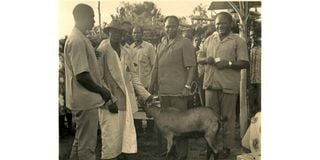
Mr Odongo Omamo (right) with Mr Mwai Kibaki, the Minister for Finance and Planning (second right), at a harambee during the Kenyatta era.
The Ministry of Research Science and Technology was to me not only a change of work but also a kind of new challenge. Luckily, the month after the appointment, I travelled to London to address the UK-Africa Agriculture Year Group as their guest of honour. The speech went down very well.
After the function, I spent four days visiting relevant research institutions in the UK. It was there that I caught the vision of what the new ministry and functions could be. I did all this while Mama Joyce, who had accompanied me to London, was mainly doing window shopping along Oxford Street. Helen, our fourth daughter, travelled from Frankfurt where she lived and brought along her three-month-old baby for us to meet.
On my return to Kenya, I found my political opponents very busy digging and cutting my political roots. They picked on a party thrown in my honour by supporters in Bondo to celebrate my success in having been awarded the DSc. (Honoris Causa) from Tamil Nadu University India in January 1987. During the party, which took place on 25th July 1987, I traced and explained the ups and downs of my checkered educational career from primary to university. I revealed that going to India for further studies was no easy task and that the former Vice-President Jaramogi Oginga Odinga, had assisted me to obtain a government of India cultural scholarship to study agriculture. I explained that all I had achieved as a result of my university education was because of that generous act.
I felt it was right that I give due credit to Jaramogi at this party, which was impressive both in terms of organisation and in the wide cross-section of leaders and the general public attending.
But my political opponents in a separate press conference picked on the occasion to malign me. They accused me of political opportunism because I publicly praised the former VP at a time when Jaramogi was not seeing eye to eye with Kanu party and its leadership. Conflicting press reports on what I said were circulated. To put an end to it all, I called a press conference and clarified what I said. I underscored the fact that what I had said was history that could not be rewritten and that I was not prepared to amend or distort it to please anybody.
Apparently, that report and my stand on Odinga’s help to me 36 years earlier in 1951, did not please everyone. Consequently, several colleagues in Parliament zeroed in on me with unwarranted attacks to please their master. They conspired to dim my star, left, right and centre. But I had reached a point of “no return”. I was determined to speak the truth and Kanu party authorities in Nairobi knew it. I did not mince my words. But the chorus of my political detractors continued unabated and increased in volume.
A press war
Strangely, in my own mind, I also felt through intuition that something was weighing me down and instead of engaging in a press war, I decided to keep quiet and let things take their course. This played in the hands of my detractors. The Kenyan public was disgusted by the unwarranted attacks on me. People were wondering what was wrong with Omamo giving thanks to Jaramogi on such an appropriate occasion. What was wrong?
Today, some 20 years later, I can venture to reply: it was all due to the illusory political culture of greed in the political arena; the culture of mistrust of your colleagues; the misguided political culture of, “I must finish you first if I am to survive”; and the crude immature and unholy political culture of creating and imagining numerous political enemies.
It was therefore no wonder when on September 18th 1987, the Voice of Kenya (VOK) news broadcast carried the news to the effect that I was relieved of my post as minister. A letter to that effect was addressed to me by the Permanent Secretary to the Cabinet and Head of Civil Service. It reached me a day later. It conveyed the following:
“I have been directed by His Excellency the President to inform you that you have been relieved of your post as Minister for Research Science and Technology with effect from the date of this letter. Your duties will be taken over by Hon. Wilson Ndolo Ayah.”
My departure from Cabinet, when juxtaposed against what my political opponents were claiming to be my political sins, did not go down very well with the general public. Many people asked: “Why has Omamo been dropped from the Cabinet?”
I could understand the people’s reaction because of my clean track record in public life and demonstrated loyalty to the Head of State, the government and Kanu since 1969. Overseas press expressed dismay and recorded that I had been dropped from the Cabinet for having said the truth about my early education.
I must thank God that while all that was happening, my conscience was very clear. I was at peace with God and argued with myself that if I’d been dropped from Cabinet because of what I had said about Jaramogi at my party, then it was unfortunate that my colleagues decided to distort the truth. Luckily for me, I was mature enough in politics to publicly reiterate that “what I said was true, come what may”. After a well-attended press conference, the local media reported in my favour.





